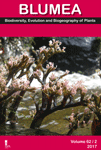
BLUMEA
Scope & Guideline
Exploring the intricate connections of life and environment.
Introduction
Aims and Scopes
- Taxonomy and Systematics:
BLUMEA publishes detailed taxonomic revisions and descriptions of new species across various plant families, highlighting the importance of accurate classification and nomenclature. - Phylogenetics and Molecular Studies:
The journal incorporates studies on molecular phylogeny, examining genetic relationships among plant species to better understand their evolutionary history and classification. - Conservation Biology:
Research addressing plant conservation, particularly in protected areas, reflects the journal's commitment to biodiversity and the urgent need to address habitat loss and species extinction. - Historical Botany and Herbarium Studies:
BLUMEA values the historical context of botanical research, publishing articles that explore the significance of herbarium collections and historical figures in botany. - Regional Flora and Biogeography:
The journal emphasizes the flora of specific regions, particularly Malesia, providing insights into biogeographical patterns and plant diversity in these ecologically rich areas.
Trending and Emerging
- Molecular Phylogenetics:
There is a noticeable increase in studies utilizing molecular techniques to explore phylogenetic relationships among plant species, reflecting a broader trend towards integrating genetic data in taxonomy. - Conservation and Ecology:
Papers focusing on conservation strategies and ecological assessments of plant species, particularly in threatened habitats, are becoming more prevalent, underscoring the urgency of biodiversity conservation. - New Species Discoveries:
The journal is increasingly publishing articles that describe new species, particularly in underexplored regions like Malesia, highlighting the ongoing discovery of biodiversity in these areas. - Taxonomic Revisions and Synonymy:
There is a growing emphasis on comprehensive taxonomic revisions, including the identification of synonyms, indicating a commitment to refining and clarifying plant classifications. - Herbarium Utilization in Research:
The use of herbarium specimens for taxonomic and phylogenetic studies is on the rise, showcasing the importance of historical collections in contemporary botanical research.
Declining or Waning
- General Flora Studies:
There seems to be a decline in broad, non-specific studies of flora. Recent issues focus more on detailed taxonomic revisions and molecular studies rather than general surveys of plant diversity. - Non-Malesian Research:
Research that does not focus on the Malesian region is less frequent, indicating a possible narrowing of the journal's scope to prioritize studies within this key geographical area. - Historical Botanical Narratives:
While historical contributions are still acknowledged, the frequency of papers focusing solely on historical narratives or biographies is decreasing, suggesting a shift towards more contemporary scientific issues.
Similar Journals

PRESLIA
Advancing Botanical Knowledge Since 1979PRESLIA, published by the Czech Botanical Society, is an esteemed academic journal that has been contributing to the fields of Ecology and Plant Science since its inception in 1979. With an impressive Q1 ranking in both categories for 2023, it stands out among its peers as a vital resource for researchers, professionals, and students alike. The journal is dedicated to disseminating high-quality research that advances our understanding of botanical sciences, encompassing a diverse array of topics from plant ecology to conservation strategies. With a ranking of #110 out of 516 in Plant Science and #103 out of 461 in Ecology on Scopus, PRESLIA consistently maintains a high impact, reflecting its crucial role in shaping contemporary scientific discourse. While traditional access options are available, the journal's commitment to fostering academic collaboration makes it a key player in the global scientific community. Located in Prague, Czech Republic, PRESLIA continues to bridge gaps in research and offers a platform for innovative scholarly communication up until 2024 and beyond.
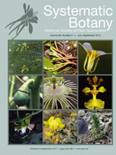
SYSTEMATIC BOTANY
Illuminating the Path of Plant EvolutionSystematic Botany, published by the American Society of Plant Taxonomists, is an esteemed journal focusing on the diverse fields of plant taxonomy, systematics, and evolution. With an ISSN of 0363-6445 and an E-ISSN of 1548-2324, this journal serves as a critical platform for researchers aiming to advance our understanding of plant biodiversity and evolutionary relationships. Operating since 1994, Systematic Botany has garnered significant recognition, achieving a Q2 ranking in Ecology, Evolution, Behavior and Systematics, and Plant Science categories, and ranking within the top half of Scopus for Genetics. The journal prioritizes publishing high-quality, peer-reviewed research, making it an essential resource for academics, practitioners, and students alike. Although it does not provide open access options, the journal's robust reputation in both American and international botanical research speaks to its pivotal role in disseminating vital scientific knowledge in the field. For those interested in the latest advancements in plant science, Systematic Botany is indispensable.
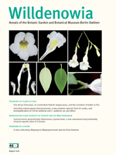
Willdenowia
Unlocking the secrets of plant evolution and behavior.Willdenowia is a prestigious scientific journal published by the Botanischer Garten & Botanische Museum Berlin-Dahlem, dedicated to advancing the field of botany and plant sciences. With an ISSN of 0511-9618, this journal has established itself as a crucial platform for researchers, practitioners, and students interested in ecology, evolution, behavior, systematics, and plant science. The journal boasts an impactful reputation, evidenced by its impressive Q1 and Q2 quartile rankings in Plant Science and Ecology, Evolution, Behavior and Systematics respectively, as well as notable Scopus rankings, placing it within the top quartiles of its categories. Although access is not open, articles published in Willdenowia contribute significantly to the global body of botanical research, making it an essential resource for anyone looking to deepen their understanding of plant biology and related ecological disciplines. The journal has continuously evolved since its inception and aims to facilitate interdisciplinary collaboration and knowledge dissemination in the life sciences.

Mediterranean Botany
Championing Open Access for Global Botanical DiscoveriesMediterranean Botany is a distinguished peer-reviewed journal dedicated to the flourishing fields of Ecology, Plant Science, and Ecology, Evolution, Behavior and Systematics. Published by the Universidad Complutense de Madrid, Servicio Publicaciones, this Open Access journal has been disseminating valuable research since 2018, ensuring that findings are accessible to a global audience, with an emphasis on Mediterranean vegetation and biodiversity. With an ISSN of 2603-9109, it contributes significantly to the academic discourse in its category quartiles, recently featuring in Q3 for Ecology and related fields. Notably, Mediterranean Botany ranks within the top half of its category in Scopus, highlighting its relevance and contribution to the scientific community. Researchers, professionals, and students alike will find the journal to be a vital resource for latest discoveries, trends, and conservation strategies in Mediterranean ecosystems, positioning it as an essential platform for advancing knowledge and fostering collaboration within the plant sciences.
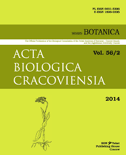
ACTA BIOLOGICA CRACOVIENSIA SERIES BOTANICA
Connecting researchers to the heart of plant science.ACTA BIOLOGICA CRACOVIENSIA SERIES BOTANICA is a distinguished journal published by the Polska Akademia Nauk (Polish Academy of Sciences), with its roots tracing back to 1996. As a pivotal publication in the field of Plant Science, it serves to disseminate high-quality research and findings, contributing to the ongoing development and understanding of biodiversity, plant ecology, and conservation. The journal is indexed under Scopus, ranked #203 out of 516 in its category, placing it in the 60th percentile and firmly within Q3 quartile for Plant Science in 2023. Researchers, professionals, and students will find invaluable content within its pages, enhancing their knowledge and supporting academic exploration. Although it currently does not offer open access options, the journal remains a crucial resource for those engaged in botanical sciences, with a commitment to advancing scholarship in Poland and beyond.
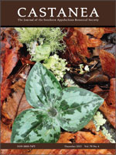
CASTANEA
Exploring the Rich Biodiversity of Trees and EcologyCASTANEA is a distinguished journal published by the SOUTHERN APPALACHIAN BOTANICAL SOCIETY in affiliation with NEWBERRY COLLEGE. With an ISSN of 0008-7475 and an E-ISSN of 1938-4386, this esteemed publication serves as a vital platform for researchers and practitioners in the field of Plant Science. It has been circulating since 1982, and its scope focuses on the study of trees, their ecology, and conservation, thereby contributing significant insights into the biodiversity of the Southern Appalachian region and beyond. Despite its current ranking in the Q4 quartile and the 5th percentile in the Scopus Agricultural and Biological Sciences category, CASTANEA is committed to advancing knowledge and fostering a deeper understanding of plant sciences among academics and students alike. The journal does not currently offer Open Access options, maintaining a traditional subscription model that allows for carefully curated and peer-reviewed content. As you explore the advances in plant biology through CASTANEA, you will find an invaluable resource that supports both emerging and established scholars in their research endeavors.
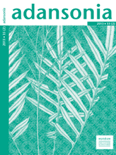
ADANSONIA
Unveiling the complexities of plant life worldwide.ADANSONIA is a distinguished, peer-reviewed open access journal dedicated to advancing the field of plant science. Published by the Publications Scientifiques du Museum in Paris since 2000, this journal serves as a critical platform for sharing innovative research and discoveries in botany, ecology, and related disciplines. With its ISSN 1280-8571 and E-ISSN 1639-4798, ADANSONIA boasts a notable Scopus rank of #383 in the Agricultural and Biological Sciences category and a 2023 category quartile ranking of Q3 in Plant Science, indicating a meaningful contribution to the academic community. The journal's scope encompasses a broad range of topics, making it a vital resource for researchers, professionals, and students alike who are exploring the complexities of plant biology. Based in France, ADANSONIA not only enhances visibility for groundbreaking research but also facilitates open communication amongst scholars, ensuring that knowledge on plant science is accessible worldwide. Located at CP 39-57, Rue Cuvier, F-75231 Paris Cedex 05, France, this journal stands as a testament to the collaborative efforts in the pursuit of scientific excellence in plant sciences.
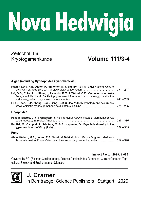
NOVA HEDWIGIA
Unveiling Insights in Ecology and SystematicsNOVA HEDWIGIA is a premier journal dedicated to the fields of ecology, evolution, behavior, and systematics, as well as plant sciences. Published by GEBRUDER BORNTRAEGER in Germany, this journal serves as a vital platform for researchers, professionals, and students seeking to disseminate and engage with high-quality studies and findings. With an ISSN of 0029-5035 and an E-ISSN of 2363-7188, NOVA HEDWIGIA has established its significance within these disciplines, reflected in its current Scopus rankings, which place it in the third quartile of both ecology and plant science categories. This esteemed publication has contributed to the advancement of knowledge and innovation since its inception in 1993, continuing through 2024, offering valuable resources for an ever-evolving academic landscape. Researchers looking to contribute to ecological studies or plant sciences will find NOVA HEDWIGIA an ideal venue for sharing their work, nurturing their academic pursuits, and joining a community passionate about the natural sciences.

KEW BULLETIN
Advancing the Frontiers of Plant Science and EcologyKEW BULLETIN is an esteemed academic journal dedicated to the fields of plant science and ecology, published by SPRINGER LONDON LTD. With an ISSN of 0075-5974 and E-ISSN 1874-933X, it has been a significant resource for researchers and scholars since its inception in 1993, currently covering converged years up to 2024. The journal holds a notable position with a 2023 category quartile ranking of Q3 in Ecology, Evolution, Behavior and Systematics and Q2 in Plant Science, highlighting its contributions to advancing knowledge in these critical areas. Its Scopus ranks—#333 in Plant Science and #475 in Ecology, showcasing a percentile rank of 35th and 34th respectively—further authenticate its standing among peers. While KEW BULLETIN is not an open-access publication, it offers valuable research findings, insightful reviews, and fosters academic discourse, making it an essential platform for professionals, students, and researchers passionate about understanding the intricacies of plant life and ecological systems. Located at 236 Grays Inn Rd, 6th Floor, London WC1X 8HL, England, the journal remains committed to disseminating high-quality research and supporting the scientific community.

TELOPEA
Navigating the Complexities of Ecology and EvolutionTELOPEA is a distinguished scholarly journal published by the Natl Herbarium New South Wales, focusing on the rich fields of Ecology, Evolution, Behavior, and Systematics, as well as Plant Science. With an ISSN of 0312-9764 and an E-ISSN of 2200-4025, the journal has been a significant contributor to the understanding of plant biodiversity and ecosystem dynamics since its inception in 1984, with regular publication resuming in 2006 through to 2024. Residing in the beautiful Australian Botanic Garden at Mount Annan, NSW, TELOPEA operates under a Q3 ranking for both Ecology and Plant Science as of 2023, reflecting its relevance and contribution to these critical scientific disciplines. Though it does not offer open access, the journal remains an essential resource for researchers and professionals seeking to contribute to and stay abreast of the latest developments in plant sciences and ecological research. With a commitment to rigorous peer review and the dissemination of high-quality research, TELOPEA stands as a vital platform for advancing knowledge in the realm of plant ecology and systematics.